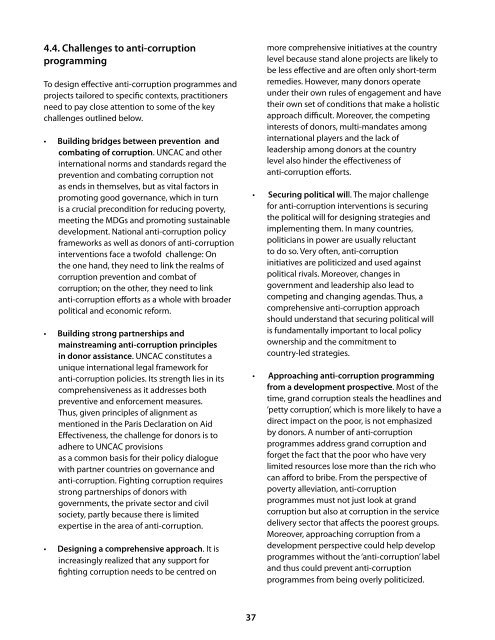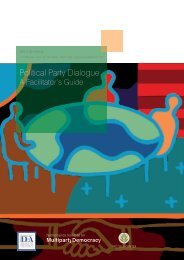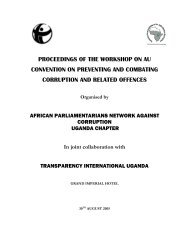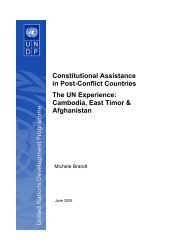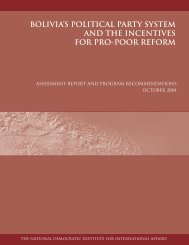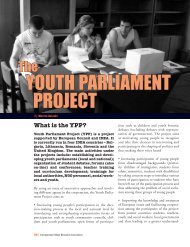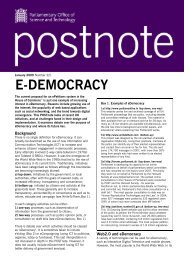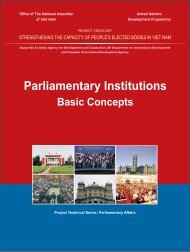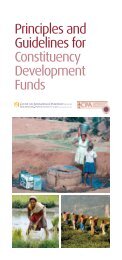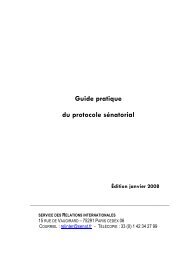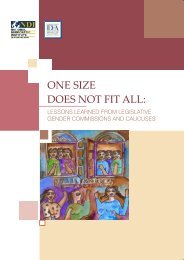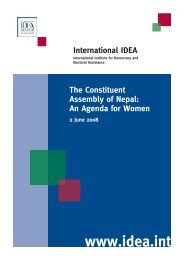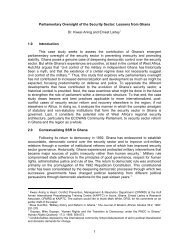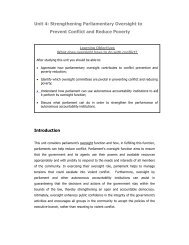Corruption and Development - pogar
Corruption and Development - pogar
Corruption and Development - pogar
Create successful ePaper yourself
Turn your PDF publications into a flip-book with our unique Google optimized e-Paper software.
4.4. Challenges to anti-corruption<br />
programming<br />
To design effective anti-corruption programmes <strong>and</strong><br />
projects tailored to specific contexts, practitioners<br />
need to pay close attention to some of the key<br />
challenges outlined below.<br />
• Building bridges between prevention <strong>and</strong><br />
combating of corruption. UNCAC <strong>and</strong> other<br />
international norms <strong>and</strong> st<strong>and</strong>ards regard the<br />
prevention <strong>and</strong> combating corruption not<br />
as ends in themselves, but as vital factors in<br />
promoting good governance, which in turn<br />
is a crucial precondition for reducing poverty,<br />
meeting the MDGs <strong>and</strong> promoting sustainable<br />
development. National anti-corruption policy<br />
frameworks as well as donors of anti-corruption<br />
interventions face a twofold challenge: On<br />
the one h<strong>and</strong>, they need to link the realms of<br />
corruption prevention <strong>and</strong> combat of<br />
corruption; on the other, they need to link<br />
anti-corruption efforts as a whole with broader<br />
political <strong>and</strong> economic reform.<br />
• Building strong partnerships <strong>and</strong><br />
mainstreaming anti-corruption principles<br />
in donor assistance. UNCAC constitutes a<br />
unique international legal framework for<br />
anti-corruption policies. Its strength lies in its<br />
comprehensiveness as it addresses both<br />
preventive <strong>and</strong> enforcement measures.<br />
Thus, given principles of alignment as<br />
mentioned in the Paris Declaration on Aid<br />
Effectiveness, the challenge for donors is to<br />
adhere to UNCAC provisions<br />
as a common basis for their policy dialogue<br />
with partner countries on governance <strong>and</strong><br />
anti-corruption. Fighting corruption requires<br />
strong partnerships of donors with<br />
governments, the private sector <strong>and</strong> civil<br />
society, partly because there is limited<br />
expertise in the area of anti-corruption.<br />
• Designing a comprehensive approach. It is<br />
increasingly realized that any support for<br />
fighting corruption needs to be centred on<br />
more comprehensive initiatives at the country<br />
level because st<strong>and</strong> alone projects are likely to<br />
be less effective <strong>and</strong> are often only short-term<br />
remedies. However, many donors operate<br />
under their own rules of engagement <strong>and</strong> have<br />
their own set of conditions that make a holistic<br />
approach difficult. Moreover, the competing<br />
interests of donors, multi-m<strong>and</strong>ates among<br />
international players <strong>and</strong> the lack of<br />
leadership among donors at the country<br />
level also hinder the effectiveness of<br />
anti-corruption efforts.<br />
• Securing political will. The major challenge<br />
for anti-corruption interventions is securing<br />
the political will for designing strategies <strong>and</strong><br />
implementing them. In many countries,<br />
politicians in power are usually reluctant<br />
to do so. Very often, anti-corruption<br />
initiatives are politicized <strong>and</strong> used against<br />
political rivals. Moreover, changes in<br />
government <strong>and</strong> leadership also lead to<br />
competing <strong>and</strong> changing agendas. Thus, a<br />
comprehensive anti-corruption approach<br />
should underst<strong>and</strong> that securing political will<br />
is fundamentally important to local policy<br />
ownership <strong>and</strong> the commitment to<br />
country-led strategies.<br />
• Approaching anti-corruption programming<br />
from a development prospective. Most of the<br />
time, gr<strong>and</strong> corruption steals the headlines <strong>and</strong><br />
’petty corruption’, which is more likely to have a<br />
direct impact on the poor, is not emphasized<br />
by donors. A number of anti-corruption<br />
programmes address gr<strong>and</strong> corruption <strong>and</strong><br />
forget the fact that the poor who have very<br />
limited resources lose more than the rich who<br />
can afford to bribe. From the perspective of<br />
poverty alleviation, anti-corruption<br />
programmes must not just look at gr<strong>and</strong><br />
corruption but also at corruption in the service<br />
delivery sector that affects the poorest groups.<br />
Moreover, approaching corruption from a<br />
development perspective could help develop<br />
programmes without the ‘anti-corruption’ label<br />
<strong>and</strong> thus could prevent anti-corruption<br />
programmes from being overly politicized.<br />
37


